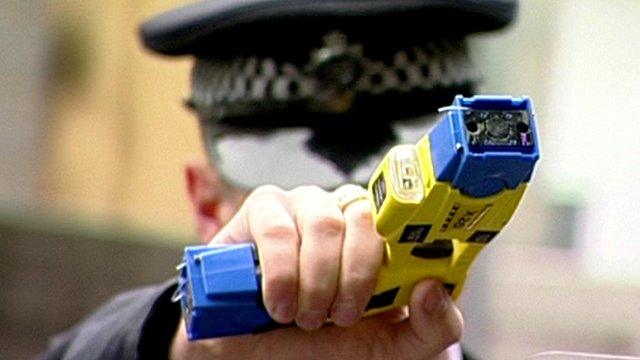Tasers drawn on '400 children in 2013'
- Published
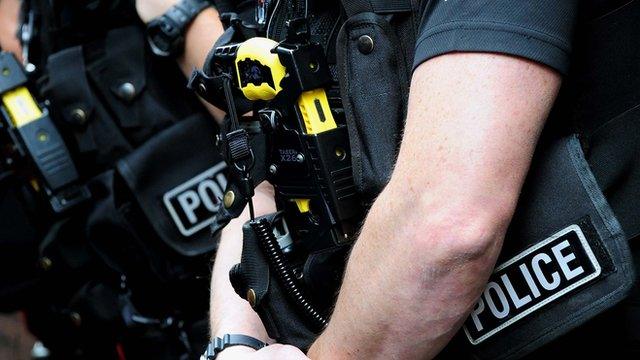
The youngest person to have a Taser drawn on them was 11, while the youngest person fired on was 14, figures showed
More than 400 children have had tasers drawn on them by police in England and Wales in 2013, figures obtained by the BBC show.
The Home Office Taser database, seen by BBC Radio 5 live, shows a 38% increase on 2012 in the number of children who had a taser aimed at them. Tasers were fired 37 times at 10 to 17-year-olds.
Ex-Home Secretary David Blunkett, who introduced Tasers, called for a review.
The Home Office said Theresa May has asked for a review of their usage.
The figures obtained through a Freedom of Information request show the youngest person to have a Taser aimed at them was 11, while the youngest person fired on was 14.

The oldest person to have one pointed at them was 85 and the oldest person actually fired on was 82.
The Home Office has not released Taser statistics broken down by age before, and warns that they are not wholly reliable because the age figures may be police estimates.
Tasers fire dart-like electrodes into a person's body and are used to incapacitate suspects.
Training urged
Speaking to 5 live, Mr Blunkett called for chief constables and police and crime commissioners in England and Wales to look at who was authorised to use Tasers and whether there were alternatives.
"I think it's time for a review that incorporates the use of Tasers with advice and support on how to deal with difficult situations," he said.
"For a youngster, 11 years old, a Taser is not in my view an appropriate way of dealing with a situation which clearly must have been out of hand, but where we need to train people to use much more traditional alternatives."

Note: The Home Office has not released Taser statistics broken down by age before and warns that they are not wholly reliable because some recorded ages may be police estimates
The Association of Chief Police Officers (Acpo) says under-18s are involved in a lot of violent crime, and that any use has to be justifiable in court.
Commander Neil Basu said he did not want to comment on individual cases but it was important to understand the circumstances surrounding the use of a Taser.
"We have to remember that children can commit violent crime too. The police are paid to intervene in those situations and Taser can be an appropriate use of force," he said.
"If that 14-year-old is committing a violent act towards a member of the public or to an officer, or if they are self-harming, then our job is to make sure that that stops in the safest way possible.
"And in certain circumstances, Taser is that option."

What's it like to be tasered?
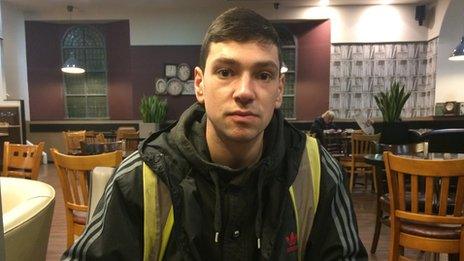
Daniel Dove was 22 when he was tasered in a police cell in Trowbridge, Wiltshire.
He says it was for flicking his underpants at a police officer during a strip search.
He had been arrested for being drunk and disorderly and assault, but the case was later dropped.
"I'd say it's like being shocked by a cattle fence, but 50,000 times stronger," he said.
"I felt like I was paralysed… I couldn't move my hand or my body.
"It wasn't a very nice experience to have."
The officer involved was later charged with assault and misconduct, but cleared by a jury at Bristol Crown Court.

Iain Gould, a solicitor at DPP Law, who has been involved in a number of cases involving claims of inappropriate use of Tasers, said his concern was "mission creep" as they become more commonly used.
"Several years ago, Tasers were deployed to certain trained firearms officers," he said.
"We now have a situation where routine rank-and-file officers are being given Tasers to use.
"My concern is that it has got out of hand and what we are seeing is effectively militarisation by stealth."
'Emotional subject'
That is not a description Commander Neil Basu said he recognised.
"I disagree with that entirely, but I do know it is a concern," he said.
"This is a very emotional subject but police forces, police officers using force, that is one of our absolute key responsibilities that the public have chosen to give us.
"And if we choose to abuse that then we would lose the power.
"There are no people more accountable than firearms and Taser-trained officers. So if an officer uses that power inappropriately, absolutely they should be held accountable to the law."
According to Home Office guidance, only authorised firearms officers and specially trained units can use Tasers.
Officers trained in the use of Tasers must consider the vulnerability of the individual and factors such as age and stature form part of this assessment.
A Home Office spokesman said: "The home secretary has been clear that the use of sensitive police powers, such as stop and search, mental health and the use of force, warrant proper accountability and transparency to ensure that they are being used appropriately.
"Taser is an important tactical option to help specially trained police officers resolve potentially violent situations safely, but it is right that its use is subject to the same level of scrutiny."
He said a review by Chief Constable David Shaw would look at how Taser is being used, who it is being used on and what the outcomes are.
In January, the Police Federation voted for all front-line police in England and Wales to be offered Tasers in light of the increased terrorism threat.
Head of the federation, Steve White, said the devices would help protect against "dangerous people" who could be preparing to attack officers.
However some critics, including Christopher Salmon, a Welsh police and crime commissioner, said the move would be a mistake.
One serving police officer who carries a Taser told the BBC that while the headline figures looked disturbing, in reality "traditional methods" did not always work.
"You only have to go to kids' football matches on a weekend to see just how tall and well-built some of these youngsters are. Just imagine being in a situation where someone of that size is going crazy with a weapon, or in some instances a knife," he said.
"As a police officer who often arrives at the location as a single-crewed officer, what are you going to do?
"In an ideal world, you try to engage the subject and talk the situation down, however, where there are other people in imminent danger that is not always possible, or where the subject is self-harming and a delay may cause more harm."
- Published31 January 2015
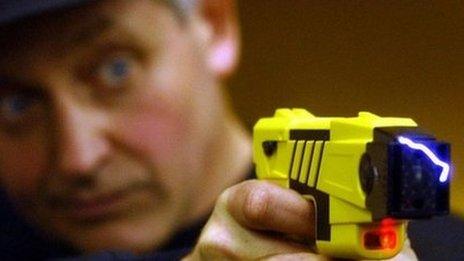
- Published31 January 2015
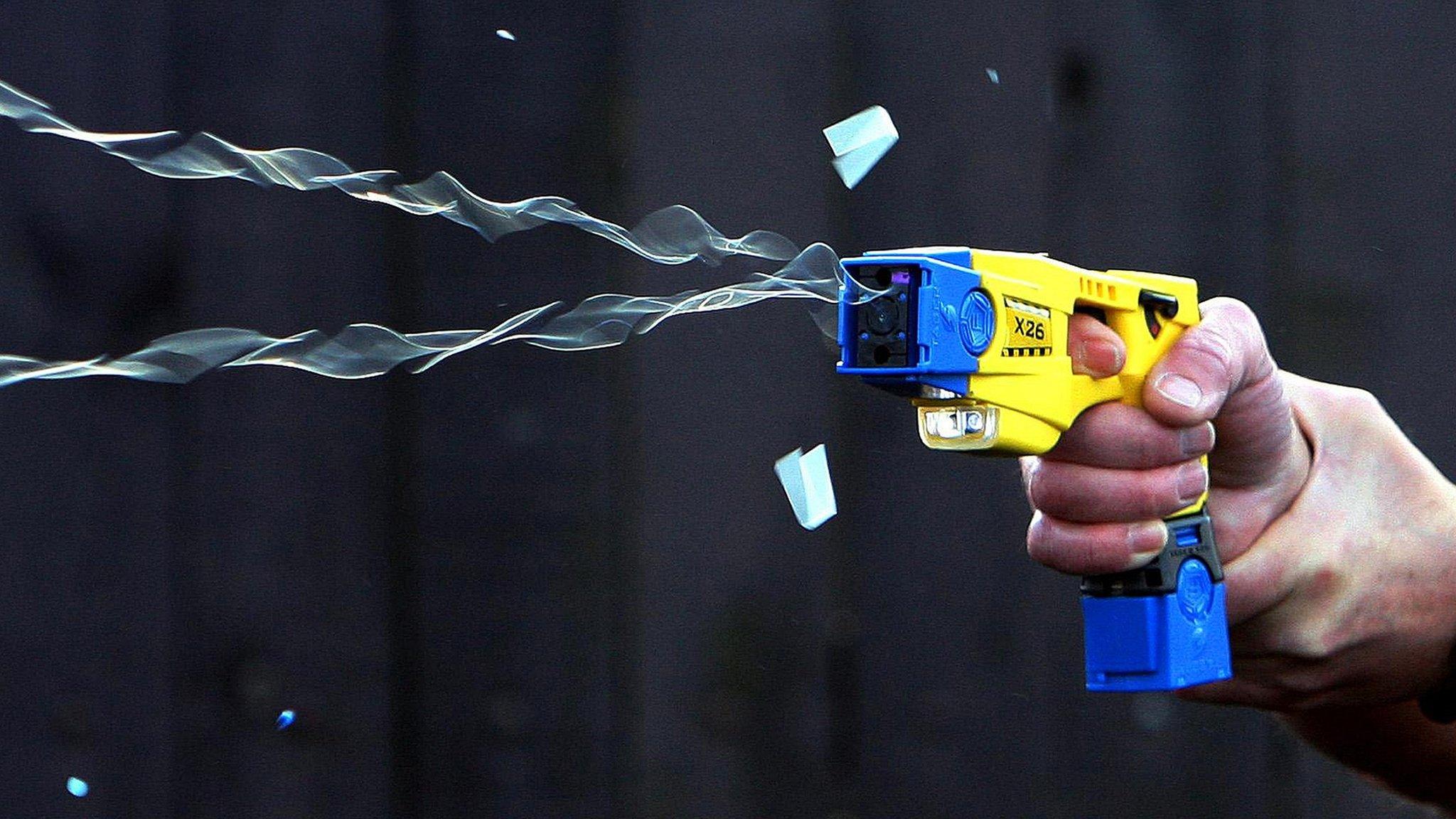
- Published31 January 2015
